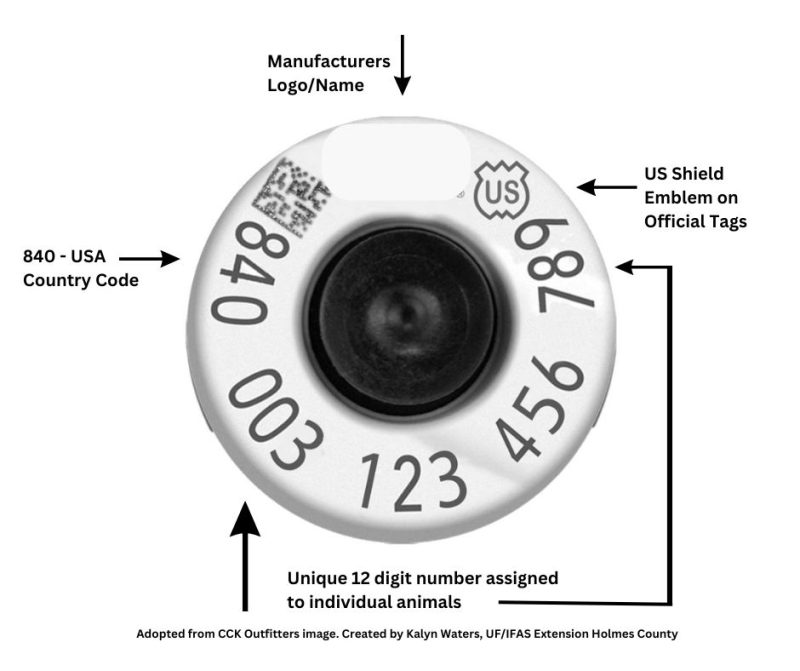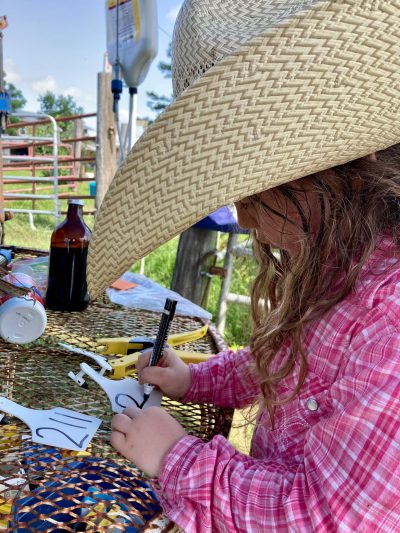Individually identifying animals is nothing new for the cattle industry. While many producers are familiar with traditional visual tags, there are some changes coming down the pipeline for individual animal identification. The talk of animal traceability has been floating around for a while now, but in April of 2024 the ruling moved forward. In a press release from the USDA, Dr. Michael Watson, APHIS Administrator stated “Rapid traceability in a disease outbreak will limit how long farms are quarantined, reduce the number of animals from getting sick, and help ranchers and farmers get back to selling their products more quickly and help keep our markets open.”
In January of 2023, an APHIS (Animal and Plant Health Inspection Service) proposal was published and through comments and discussions of stakeholder groups it moved to final rule. According to the USDA, “This rule is the culmination of goals established by USDA to increase traceability, one of the best protections against disease outbreaks, and enhances a rule finalized in 2013 for the official identification of livestock and documentation for certain interstate movements of livestock.”
Federal electronic identification (EID) tags are commonly referred to as an “840 tags“. Each tag has a unique 15 digit number, but all start with 840 – which is the USA country code. This is considered “official identification” by USDA and each state. 
After reviewing the Frequently Asked Questions: Animal Disease Traceability Rule here are some key points for cattle producers:
- EID tags are a technology upgrade from the traditional metal tags that have been used for decades. If you have cattle that are already tagged with the official metal tags, they do not need to be retagged. The EID tags will be what are issued moving forward.
After November 5, 2024, any newly applied official ID must be an approved EID (840 tag).
–
- There is no mandate to tag the cattle you already own until they leave your property and fall into one of the following categories. Official ID is required when/for:
–- All dairy cattle of any age moving interstate.
– - All exhibition, recreation, or rodeo animals moving interstate.
– - Beef cattle, eighteen months of age and older, moving interstate.
– - In Florida, all cattle, eighteen months of age and older moving within the state unless:
–- Moving directly to slaughter facility
– - Moving to another premises under same management and no commingling with cattle of a different ownership.
– - Moving to an approved tagging site (approved livestock market).
– - Cattle moving interstate directly to slaughter are exempt from requirement.
–
- Moving directly to slaughter facility
- All dairy cattle of any age moving interstate.
- The EID tags are issued through the state veterinarians office at no cost to producers. There is also a limited supply at the district FDACS offices.
–- States are provided an annual allotment of tags to distribute within the state specifically for use in replacement heifers. In Florida, we distribute these tags to accredited veterinarians for use with official activities (calfhood brucellosis vaccination, tuberculosis testing, Certificates of Veterinary Inspection, etc.) and to our District FDACS offices. The annual allotment is less than 10% of the annual calf crop in the state. Which means we must limit the number of tags we provide to any single producer.
–
- States are provided an annual allotment of tags to distribute within the state specifically for use in replacement heifers. In Florida, we distribute these tags to accredited veterinarians for use with official activities (calfhood brucellosis vaccination, tuberculosis testing, Certificates of Veterinary Inspection, etc.) and to our District FDACS offices. The annual allotment is less than 10% of the annual calf crop in the state. Which means we must limit the number of tags we provide to any single producer.
- All sexually intact beef cattle over 18 months of age need to be officially identified (840 tag) for interstate travel. This means that most feeder cattle (steers and/or spayed heifers) will be exempted from needing Official ID for transport. See list above for which animals need to have official ID.
– - Cattle traveling to an official tagging location (most commonly a livestock market/stockyard) can be officially identified upon arrival.
– - www.interstatelivestock.com is a website that allows for you to select where you are traveling, what type of livestock and other information to help you determine what is required for transport.
–
While most ranchers don’t get overly excited about changes, this new ruling should be an easy integration for most operations and will have minimal impact on your day to day management. If you have any questions, please contact your county extension agent, or the FDACS Division of Animal Industry – (850) 410-0900 – animalIndustry@FDACS.gov.
- Nutrient Cycling in Grazed Pastures - July 18, 2025
- Summer Mineral Consumption for Cattle on Pasture - July 11, 2025
- Hens in the Heat - July 11, 2025

